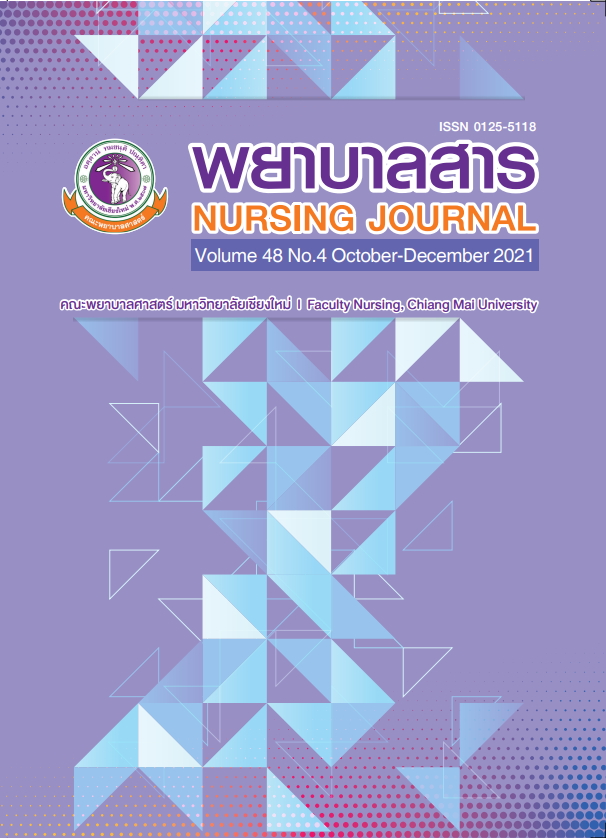Effects of a Self-efficacy Enhancement Program on Preventive Behaviors and Body Mass Index in People at risk of diabetes
Keywords:
People at risk of diabetes, Perceived self-efficacy, Preventive behavior, Body mass indexAbstract
People at risk of diabetes have a chance of becoming a new diabetic if they don't have a diabetes-preventing approach. This quasi-experimental research aimed to examine the effects of a self-efficacy enhancement program on preventive behaviors and body mass index in people at risk of type 2 diabetes. The study samples were 50 people who were screened for diabetes at Labaoya Health Promoting Hospitals in Amphoe Muang Nan, Nan Province. Participants blood glucose levels were at 100-125 mg./dL, and they were 35-59 years old. The subjects were assigned, by a simple random sampling method, to either an experimental or comparison group, with 25 in each. The comparison group received usual nursing care. The experimental group received the Self-Efficacy Enhancement Program which was developed based on Bandura’s self-efficacy theory. The research instruments included 1) The Self-Efficacy Enhancement Program, and 2) General Information Questionnaires and Preventive Behaviors Questionnaires for people at risk of diabetes. The reliability of the Preventive Behaviors Questionnaires was obtained using Cronbach’s alpha coefficient with a value of .93. The duration of implementation and data collection was 12 weeks. Data were analyzed using descriptive statistics, paired t-test, and independent t – test. The results revealed that: 1. After the intervention, the experimental group had an average score for preventive behavior higher than before participating in the program, with statistically significance at .001, and had an average score of body mass index lower than before participating in the program, with statistically significance at .001 2. After the intervention, the experimental group had an average score for preventive behavior higher than that of the comparison group with statistical significance at .001, and had an average body mass index lower than the comparison group with statistical significance at .01 The result shows that the Self-Efficacy Enhancement Program could improve preventive behaviors and decrease body mass index in people at risk for diabetes, and can be used for guiding nurses in health promoting hospitals to prevent diabetes mellitus in people at risk for diabetes.
References
American Diabetes Association. (2018). Standards of medical care in diabetes-2018. Diabetes Care, 41(supplement 1), e153-e159. (in Thai)
Bandura, A. (1977). Self-efficacy: Toward a unifying theory of behavioral change.Psychological Review, 84(1), 191-215.
Bandura, A. (1986). Social foundation of thought and action: A social cognitive theory. Englewood Cliffs, NJ: Prentice-Hall.
Bansal, N. (2015). Prediabetes diagnosis and treatment: A review. World journal of Diabetes, 6(2), 296-303.
Chen, M., Wang, R., & Hung, S. (2015). Predicting health-promoting self-care behaviors in people with pre-diabetes by applying Bandura social learning theory. Applied Nursing research, 28(2), 299-304. doi: 10.1016/j.apnr.2015.01.001
Chen, S. F., & Lin, C. C. (2010). The predictors of adopting a health-promoting lifestyle among work site adults with prediabetes. Journal of Clinical Nursing, 19(1), 2713-2719. doi: 10.1111/j.1365-2702.2010.03320.x.
Cioffi, C. E., Ranjani, H., Staimez, L. R., Anjana, R. M., Mohan, V., & Weber, M. B. (2018). Self-efficacy and diabetes prevention in overweight South Asians with prediabetes. BMJ Open Diabetes Research & Care, 6(1), e000561. doi:10.1136/bmjdrc-2018-000561
Diabetes Prevention Program Research Group. (2002). Reduction in the incidence of type 2 diabetes with life style intervention or metformin. The New England Journal of Medicine, 346(6), 393-403.
Glass, G. V. (1976). Primary, secondary and meta-analysis of research. Educational Research. 5(1), 3-8.
International Diabetes Federation. (2017). IDF diabetes atlas eight edition 2017. Retrieved from file:///C:/Users/ASUS/Downloads/IDF_DA_8e-EN-final%20(1).pdf.
Ministry of Public Health. (2018). Medical and health information system Ministry of Public Health 2017: Illness with major non-communicable diseases. Retrieved from https://hdcservice.moph.go.th/hdc/main/index_pk.php (in Thai)
Polit, D. F., & Beck, C. T. (2012) Nursing research: Generating and assessing evidence for nursing practice (9th ed.). Philadelphia: Lippincott, Williams & Wilkins.
Sandee, T., Leelukkanaveera, Y., & Homsin, P. (2017). The effects of self-efficacy enhancement on health promotion behaviors, body weight and fasting plasma glucose among pre-diabetes in the community. Songklanagarind Journal of Nursing, 37(2), 53-66. (in Thai)
Srivanichakorn, S. (2009). Integrated diabetes management. Nakhon Pathom: Saha Pathanapaisan. (in Thai)
Supanpiew, T., & Intaranongpai, S. (2016). Relationship between perceived self-efficacy and diabetes prevention behavior in risk group in Nongbok Sub- district, Laosueakok District, Ubonratchathani Province. Journal of Science and Technology Mahasarakham University, Special edition, 464-471. (in Thai)
Suphunnakul, P., Charonesrimaung, S., Singhadej, O., Songthap, A., & Junsukon, E. (2018). Factors predicting preventive behaviors of type2 pre-diabetes in Mueang District, Phitsanulok Province, Thailand. Journal of Public Health and Development, 16(3), 55-66. (in Thai)
Thianwan, Y., Nirattharadorn, M., & Wattana, C. (2012). The effects of a self-care promotion program on self-care behaviors and blood sugar levels among people at risk of diabetes. Nursing Journal, 39(2), 132-143. (in Thai)
Thongsumrit, D., Meebunmak, Y., & Borisut, K. (2017). Effects of health behavior modifying program on ability of self-care among risk group of diabetes mellitus in Watphleng Subdistrict, Watphleng District, Ratchaburi Province. Journal of Phrapokklao Nursing College, 28(1), 26-37. (in Thai)
Wongsricha, W., & Kongtaln, O. (2012). Application of self-efficacy program for changing health behaviors in diabetes high risk group at Nakae Community Hospital, Nakhonpanom Province. (Dissertation). Khon Kaen University. (in Thai)
Downloads
Published
How to Cite
Issue
Section
License
บทความที่ได้รับการตีพิมพ์เป็นลิขสิทธิ์ของวารสารพยาบาลสาร
ข้อความที่ปรากฏในบทความแต่ละเรื่องในวารสารวิชาการเล่มนี้เป็นความคิดเห็นส่วนตัวของผู้เขียนแต่ละท่านไม่เกี่ยวข้องกับมหาวิทยาลัยเชียงใหม่ และคณาจารย์ท่านอื่นๆในมหาวิทยาลัยฯ แต่อย่างใด ความรับผิดชอบองค์ประกอบทั้งหมดของบทความแต่ละเรื่องเป็นของผู้เขียนแต่ละท่าน หากมีความผิดพลาดใด ๆ ผู้เขียนแต่ละท่านจะรับผิดชอบบทความของตนเองแต่ผู้เดียว






